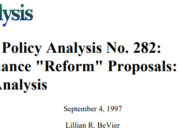One of the problems that the regulatory movement has never come to grips with is the cognitive dissonance between decrying the influence of traditional political actors and the pro-regulatory community’s own quest for influence. Despite the oft-repeated goal of blunting the impact of “special interests” in politics, the pro-regulatory lobby wields a significant amount of influence with powerful politicians and is, itself, a “special interest.”
For example, even though the Campaign Legal Center, a “reform” organization chaired by John McCain’s former counsel, Trevor Potter, doesn’t run campaign or issue advertisements, it can and does exercise political influence by providing a powerful senator, such as John McCain, with millions of dollars of free legal services. No problem there – since no money changes hands and no voters were informed about a candidate’s position, there’s no threat of corruption at all!
What about throwing big banquets honoring, say, Senator McCain and inviting the organization’s major donors to a private reception with the Senator (as the pro-“reform” Brennan Center once did) after providing him with PR, legal services, and advocacy on an issue of “transcendent importance” to the Senator? No question of unfair access or influence here folks!
In other words, those who exercise great influence playing a Washington insiders’ game are fine, but if you try to inform voters about a candidate’s strengths and weaknesses and try to persuade voters in some manner, well, naturally, lines must be drawn, public integrity must be protected, and so on and so forth.
Is there any doubt that CLC, Public Citizen, the Brennan Center, Common Cause, CREW, the League of Women Voters, the Center for Political Accountability, the Council for Economic Development, and all those other “reform” groups exercise sizeable political influence? Is there any question that they do so largely out of the public eye, and often not to persuade voters how to vote, but to persuade politicians how to act outside of public scrutiny? Is there any question that the pro-regulatory community’s influence is based, to a substantial extent, on their ability to raise and spend money to support their operations?
Influence for me, but not for thee, is a constant that the pro-regulatory movement does not, and cannot address, because they too want a chunk of the influence they constantly decry. If the pro-regulatory community did not want influence – and let’s be clear, they want “undue influence,” in the sense that they want a bigger say about what happens in Washington than most citizens – they would not exist. Case in point: the regulatory movement rarely, if ever, proposes regulation that would limit its sources of influence or the way in which it obtains access and exercises influence.
There is nothing wrong with the desire for influence. However, there is something wrong with desiring influence while attempting to stamp out the channels by which others exercise influence. The “reform” community’s modus operandi demonstrates either a remarkable lack of self-awareness or an incredible capacity for hypocrisy. Regardless of what this demonstrates, the total lack of acknowledgement about the level of influence the pro-regulation community wields is, apparently, a permanent feature of the movement to regulate politics and political participation.
The idea that the primary source of “corruption” or political inequality is spending on advertisements informing and persuading the electorate strikes me as a remarkably incorrect conclusion with undemocratic consequences for our nation.













